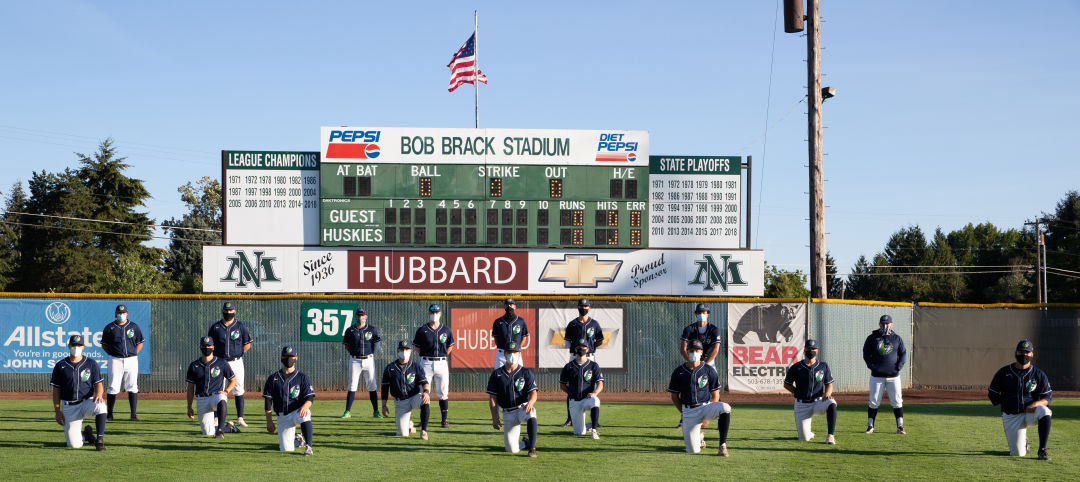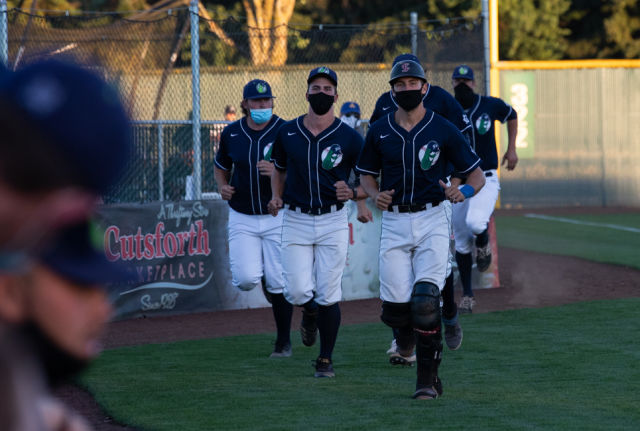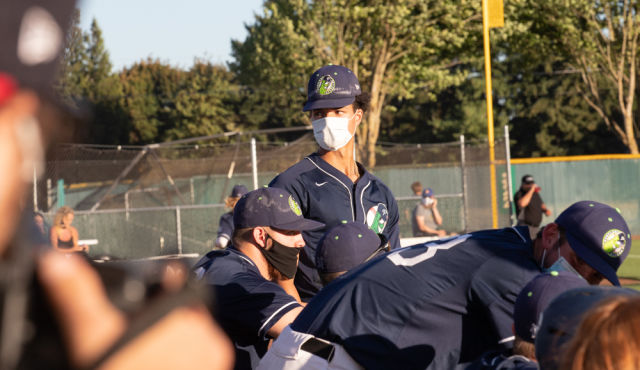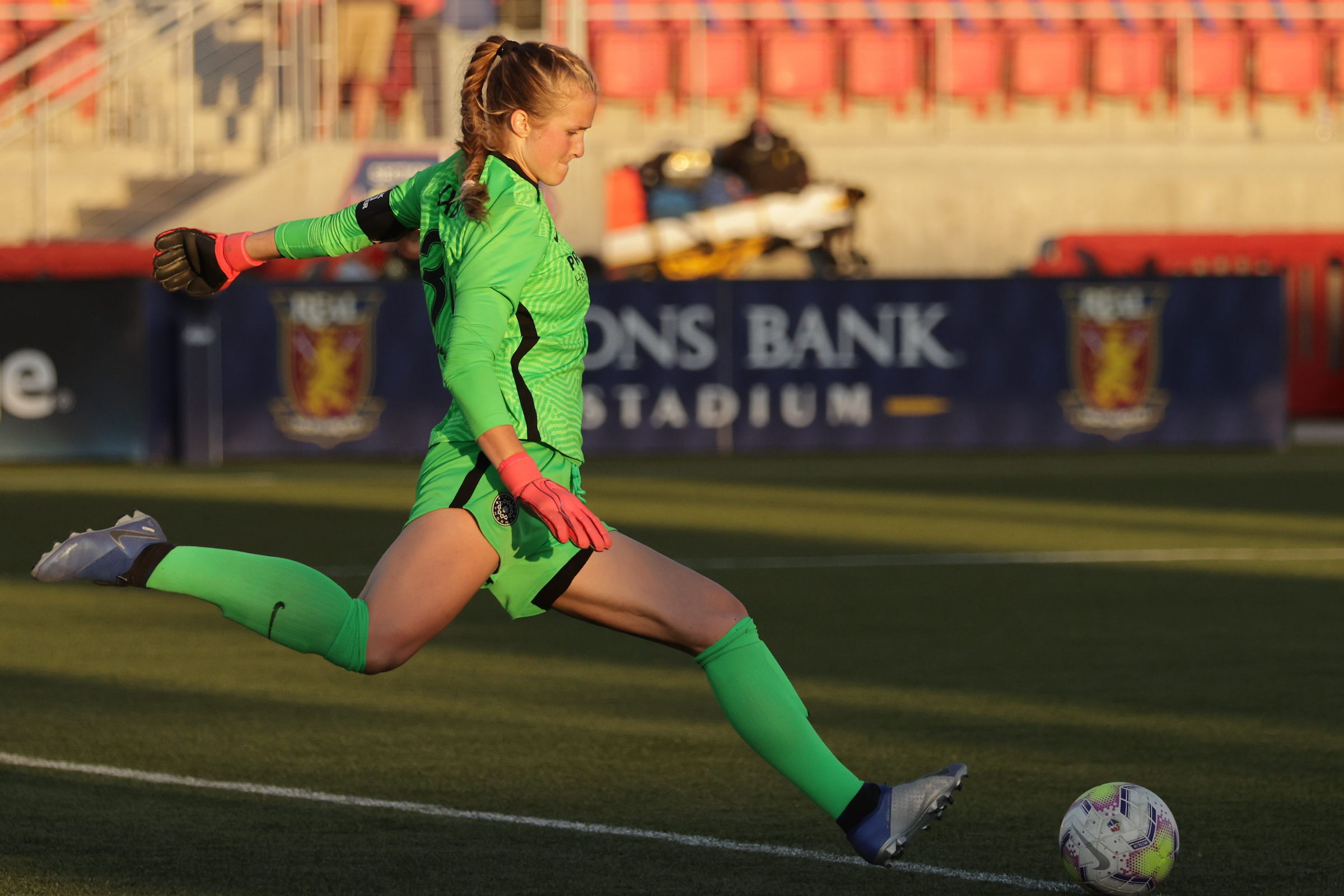How the Portland Pickles Pulled Off a Summer Baseball Season

The 2020 Portland Pickles of the Wild Wild West League
Image: Alli Weseman
Pulling up to the front gates of Bob Brack Stadium at Aurora’s North Marion High School, I roll down the window and stick out my head so a coworker can take my temperature. Once I’m allowed in, along with other interns I set to work sanitizing dugouts, stocking handwashing stations, refilling spray bottles, distributing more temperature guns to check everyone arriving at the stadium, preparing fan waivers, and making sure there’s ice in the broadcast booth so the computers won’t overheat and shut down in the middle of the game for fans watching on Facebook Live and YouTube.
This is baseball in 2020—another exciting doubleheader for the Wild Wild West League, the Portland Pickles’ replacement for the shut-down West Coast League summer collegiate wood-bat season. It ran one month instead of two, with four teams instead of 12, a hundred or so fans per game instead of 2,000-plus, and based at Bob Brack instead of Walker Stadium in Southeast Portland’s Lents Park due to the lag in the phased reopening for Multnomah County. The rosters for the Pickles as well as the Portland Gherkins, the West Linn Knights, and the Gresham GreyWolves were filled mostly with college students who lived locally.
Like summer baseball leagues, summer internships looked a lot different in 2020. Many switched from on-site to remote, while others were canceled altogether as companies scrambled or downsized in the pandemic. I was one of the lucky few—my internship with the Portland Pickles didn’t suffer that fate, though it certainly shifted away from what I’d anticipated, learning from the team photographer and doing community outreach. Instead of preparing for the season opener against the Bellingham Bills on June 5, the Pickles organization staggered interns and staff inside the office in a converted house near Walker Stadium (sometimes people worked on the porch or in the backyard) in the buildup to the July 11 opener. Masks were required to be worn inside and outside at all times.

Players entered the stadium masked, but could remove their masks on the field during play.
Image: Alli Weseman
Players had additional safety precautions to follow, some even before the league began. They had to quarantine for seven days prior to the start of games. During the season they were asked to act responsibly and shelter in place as much as they could when they weren’t playing. Coaches, staff, and fans were required to wear a mask at all times (unless they were actively eating or drinking). One of my intern duties was to go around and remind fans to pull up their masks or they would be given a warning and reminded that the whole league depended on people following the rules. If they were asked again, they had to leave. Players who weren’t out on the field had to follow the same rules as fans and were given a warning if they weren’t wearing a mask. If they were asked a second time, they would be suspended for a game. Just like three strikes and you’re out, those who still weren’t wearing a mask couldn’t play in the league anymore. All of the players set an example and wore their masks throughout the tournament, even when it was 100 degrees and that cloth was unbearable on their faces. Kids who turned in foul balls had to have their masks on, or else they wouldn’t get their Popsicle.
As the summer league was taking shape, the Pickles also put together distanced kids’ baseball and softball day camps (an opportunity for parents and kids to get a break from each other—no judgments!—after sheltering in place for months). Before entering the field, campers had their temperature checked and were required to wash their hands. Squirting soap into their hands was also one of my unexpected internship duties, and as kids finished washing I would lead them to the baseball field and would make sure everyone was six feet apart and masks were being worn at all times. While the coaches were leading drills, a few of us would place tennis balls in between the kids to keep them spread out. Parents had to wear masks at drop-off and pickup. The July camps were a success, and across town on the west side, the Hillsboro Hops were inspired to lead their own kids’ camp in August.

Some people in this picture would get a warning for chin masking or nose exposure, but Central Catholic grad Christian Cooney, who lost out on most of his freshman season at the University of Portland, shows us how to rock a mask.
Image: Alli Weseman
The Wild Wild West League was five games in when two players tested positive for COVID-19. The organization immediately canceled all games for seven days. We weren’t allowed back in the office or at the field until we received a negative test result. While we waited, some of us had to sit out games or skip helping out at camp to ensure we didn’t get anyone sick, while others pulled double duty, working in the morning with summer camps and then going straight to the field to help with the games. There were no other positive tests once games resumed.
Major League Baseball has been dealing with its own positive COVID tests and canceled games, the WNBA and NBA play in bubbles, soccer leagues experiment with regional travel after their own bubble tournaments have ended, and the NFL is prepping its 2020 opening. Meanwhile, the Pickles showed how to safety put on a season with fans—albeit just a few in a high school stadium. As with a few other spontaneous leagues around the country, we provided an escape for many people who had been sheltering in place. While some people may have been annoyed by someone bugging them to put on their face mask or sit six feet apart, college athletes who saw their spring seasons canceled in March got to play ball—and, most important, we got to watch it.




